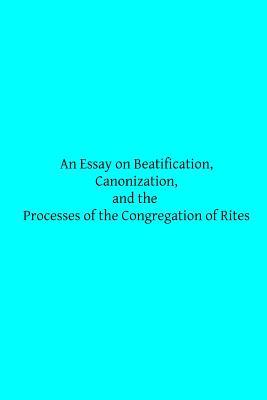- Bible
- Read the Bible
- Bible Versions
- Verse of the Day
- Reading Plans
- Verses by Topic
- Books of the Bible
- Bible Images
- Study
- Commentaries
- Concordances
- Dictionaries
- Encyclopedias
- Sermons
- Bible Atlas & Maps
- BP Wiki
- Devotionals
- Today's Devotionals
- Light of the World
- All Devotionals
- Inspirational Quotes
- More
- Picture Quotes
- Videos
- Inspirational
- Bible Study
- What The Bible Says
- Bible Q&As
- Daily Bread
- Bible by Genre
- Bible Stories
- Random Bible Verse
- Community
- Store
An Essay on Beatification, Canonization, and the Processes of the Congregation o
by Frederick W. Faber
What is Canonization? How is it done? What does it import to a Catholic? How does it differ from beatification? What is meant by the title of Venerable, and by the Holy See decreeing that a man has practised virtue in an horoic degree? What is the amount of authority attaching to each of these acts of the Church, and in what sense are they acts of the Church? What sort of obligation, if any, do they lay Catholics under what sort of value, considered simply as questions of evidence, have they to others? And what sanction, if any, do tho biographies of the saints borrow from the fact, that the Church has made their cultus matter of precept or permission. And what sort of authority do the peculiar formation and jealous scrutiny of the processes give them, simply as human testimony judicially sifted. This book proposes to answer these important questions.
BUY NOW
Paperback, 142 pages
Published January 21st 2014 by Createspace Independent Publishing Platform (first published January 24th 2012)
© 2025 Bibleportal.com All rights reserved.

Frederick William Faber, British hymn writer and theologian, was born at Calverley, Yorkshire, where his grandfather, Thomas Faber, was vicar.
In January 1837, he was elected fellow of National Scholars Foundation. Meanwhile, he had given up the Calvinistic views of his youth, and had become an enthusiastic follower of John Henry Newman.
He accepted the rectory of Elton in Huntingdonshire, but soon after went again to the continent, in order to study the methods of the Roman Catholic Church. After a prolonged mental struggle, he joined the Catholic Church in November 1845.
Faber published a number of prose works, and three volumes of hymns, among the most well known is Faith of Our Fathers.
... Show more